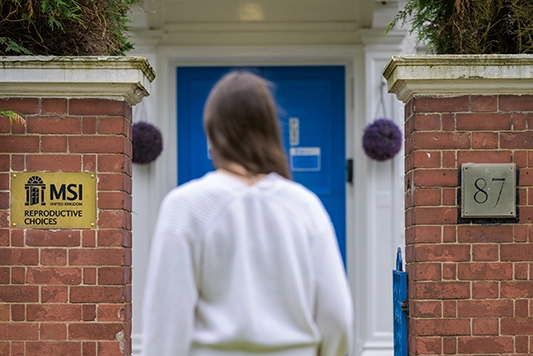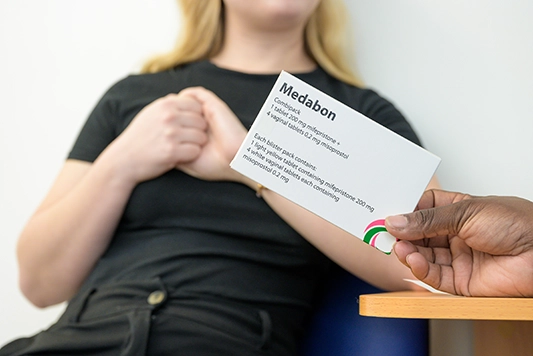There are many reasons why more people are accessing abortion and vasectomy care. No matter the reason, there will always be a need for high quality reproductive healthcare services people can trust. For some, that will be Long-Acting Reversible Contraception or a vasectomy. For others, that will be a morning after pill. And for others, that will be abortion care.
In this blog, MSI UK’s Head of External Affairs Louise McCudden reflects on this year’s national abortion statistics for England and Wales and looks at why the abortion rate is rising.
Abortion figures are rising. They are rising so much there’s a processing backlog; this year’s abortion statistics have only been published up to the first six months of last year. From these initial figures alone, it’s clear that there’s an unprecedented rise in demand. National figures show a 17% rise, which is not surprising to us at all.
At MSI Reproductive Choices UK, we analyse trends, and we hear stories from those using our services about why they needed or chose an abortion, and how they feel about it. The published national figures showed an overall 17% rise during the first six months of last year. Our internal figures indicate that there has been an even greater rise since then.
Unprecedented rise
During the first five months of 2023, we saw 29% more clients than the previous year. Some of this will vary by provider, by NHS contract type, and by region. In some parts of the country, the first two months of 2023 saw a 134% increase compared with the same period in 2022. And that doesn’t explain the whole picture. Vasectomy care was up by 54% during this period, and there has been a rise in need for sexual and reproductive health services like contraception, too.
Cost of living crisis
There is rarely one isolated reason why somebody has an abortion or gets a vasectomy. But what we hear from the people accessing care with us is that economic pressures are playing a bigger part in those decisions.
The cost of living crisis means that having a child (or more children) has gone from being expensive to downright impossible for many. Financial pressures are a major part of why some are unable to emotionally cope with continuing their pregnancy. It doesn’t only impact those on the lowest incomes; most people’s financial circumstances are changing, and they’re having to make decisions about the size of their families accordingly.
Access to contraception
Long waits and an unclear process are just some of the barriers faced when accessing contraception, especially for women. Historically, most women have accessed contraception through their GP but the current waiting times for seeing a GP, as a result of the wider NHS pressures, are highly impractical for a service like contraception.
At the moment, providers like MSI Reproductive Choices UK are only commissioned by the NHS to offer Long-Acting Reversible Contraception (LARC) for people who are “sexually active” (a term which, incidentally, may not even include penetrative sex for some people in any case) despite LARC being an excellent treatment for various medical conditions. When people come to us as a trusted provider, we are forced to ask them whether they are “sexually active” before we can provide services.
GPs are working incredibly hard under difficult circumstances but not every GP is trained to provide LARC, nor are they necessarily the right people to provide a sensitive, often stigmatised service. In some parts of the country, people know their local GP well; they may even be a relative. It should be possible to choose the best place to access reproductive healthcare for your own, individual needs.
Cuts and underinvestment
While there is no doubt that the COVID-19 pandemic made pressures on healthcare services worse, many of the issues pre-date COVID. As long ago as 2017, the Advisory Group on Contraception (of which MSI Reproductive Choices UK is a member) warned that services were “at tipping point.” And, as our All-Party Parliamentary Group (APPG) on Sexual and Reproductive Health documented in its report, ‘Access to Contraception: Women’s Lives, Women’s Rights’ many of the issues date back to 2015.
Between 2015/16 and 2020/21, the public health grant that local authorities get for sexual health services was cut by £1billion, or 24%. Investment in sexual and reproductive health services including contraception was cut by nearly 17%. There was a 167% increase in the number of local authorities cutting and closing contraceptive services, with 32 councils making closures and a third of local authorities reducing the sites commissioned to provide contraceptive services. All of this at a time when there has been a growing demand for sexual and reproductive healthcare services overall as people continue to make smart decisions about consent, safer sex, and their reproductive health.
Not only that but these cuts often disproportionately impact the poorest parts of the country. The people on the lowest incomes therefore not only have to worry about the costs associated with continuing their pregnancy (and those costs aren’t just about parenting; being pregnant itself can be expensive). They can be more likely to experience an unintended pregnancy in the first place.
Making choices
Of course, some unplanned pregnancies will be a source of joy. But with 45% of pregnancies already “unplanned and associated with feelings of ambivalence” (according to Public Health England) even before the cost of living crisis, it’s unsurprising that spiralling costs for food, clothes, rent, mortgages, childcare and travel are all contributing to a greater demand for abortion care.
Access to contraception isn’t the only reason for the rising abortion figures. The stress and instability of the last three years has created all sorts of indirect ripple effects into people’s lives. According to the Local Government Association, there was a 795% rise in domestic abuse between 2019 and 2021. While that was largely connected with lockdown, the longer-term consequences of the COVID period (including economic instability, mental health issues, housing insecurity, or alcohol and substance misuse) continue to indirectly contribute to circumstances that increase the risk of domestic abuse and make it more difficult for women in particular to leave abusive partners.
Pregnancy is one of the most dangerous times for those in abusive relationships. Reproductive coercion (for example, forced pregnancy or interfering with contraception) is a common means of control. It can be used to make it harder for women to leave relationships or as an excuse to control a partner’s diet, health choices, and general bodily autonomy.
Reproductive choice is essential for giving control and autonomy in these circumstances. That doesn’t just mean being legally able to have an abortion; it means choice of contraception, choice of abortion method, choice of location, and as far as is practical, choice about timing. In reality, this means the choice to take both abortion pills at home (which MSI Reproductive Choices UK successfully advocated for last year together with partners) and a choice of provider.
What is the solution?
The underinvestment in public health, and specifically sexual and reproductive health over the years has left a major gap, and right now, women are disproportionately paying the price. Not always, of course, but it is overwhelmingly women who will be most affected by pregnancy (financially, physically, and emotionally), women who are most likely to need protection against reproductive coercion, women who are disproportionately responsible for childcare and women who are unable to get treatment for their health needs without explaining how much sex they’re having.
But the solution goes deeper than that. No matter how well-funded and accessible contraceptive services are, there will always be a need for abortion care. It’s an established healthcare service, and it should be resourced accordingly. There are a range of factors behind the increase we’re seeing in abortion care, and they’re interconnected. The most important thing we can do is make sure that no matter their circumstances and no matter their reasons, anyone who needs or chooses a particular form of reproductive healthcare should be able to access a high quality service they can trust. For some, that will mean LARC. For others, that will mean the morning-after pill. And for others, that will mean abortion.







